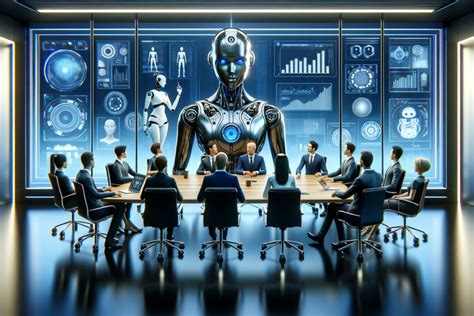In recent years, the idea that AI will take over jobs has morphed from dystopian science fiction to a palpable reality. Advances in machine learning and automation have already begun to reshape industries and redefine roles, causing efficiencies previously unimagined while stirring anxieties about job displacement. The conversation has predominantly been around manual labor jobs and lower-level clerical roles, but now it’s time to challenge the status quo: what if AI could replace even the CEO? This idea is controversial, yet thought-provoking, and it’s worth exploring the potential, the limitations, and the broader implications of such a shift.
Historically, envisioning a factory of the future was an interesting exercise. Visionaries like Warren Bennis once quipped that ‘The factory of the future will have only two employees, a man and a dog. The man will feed the dog. The dog will keep the man from touching the equipment.’ But substitute the humans with robots, and you essentially have an operation that can run autonomously — a dream for some, a nightmare for others. The increased automation in factories is a tangible endpoint for today’s AI capabilities, but extending this to corporate boardrooms raises questions. For one thing, do AI systems possess the qualities necessary to emulate the leadership provided by a human CEO?
The typical modern CEO’s role is complex, entailing responsibilities that range from strategic vision and leadership to ethical decision-making and crisis management. Proponents of AI leadership argue that many facets of a CEO’s job are ripe for automation. An AI could certainly be programmed to optimize decisions based on vast databases of prior examples and real-time analytics. In budgeting and reporting, AI can outperform humans by swiftly processing large datasets and generating insights that align with financial and strategic goals.
However, vibrant discussions in online forums and comment sections indicate skepticism. One poignant remark noted that AI might indeed outperform many of the bottom-tier CEOs — those who contribute minimally while reaping disproportionate rewards. AI, with its cost-effectiveness, might be a godsend in these scenarios. But even as enticing as the idea sounds, another perspective argues that AI lacks the nuanced understanding and human empathy critical for top-level decision-making. The capability to weigh risks, navigate uncertainty, and inspire teams goes beyond mere data processing. Also, accountability is a factor. A human CEO can be held responsible for their decisions, while AI, regardless of sophistication, lacks this dimension, raising the dilemma of ethical responsibility.
Moreover, the human elements of leadership — like intuition, vision, and interpersonal skills — are challenging to codify. Some commenters cited examples of effective CEOs like Tim Cook of Apple, whose acumen in supply chain management and leadership have brought unparalleled success to the company. While it’s arguable that AI can assist in these areas, it’s less certain it could lead in a manner similar to nuanced human leadership. For instance, operational advice, yes; but emotionally resonant motivational speeches that inspire teams? Perhaps not.
The question also arises about the qualitative impact on employees. An insightful comment mentioned that ‘a good portion of CEOs are not good CEOs.’ This statement underscores a rich critique central to the discussion: organizations often suffer under uninspiring or ineffective leadership. Could AI mitigate this by eliminating bias and favoritism, making decisions based on pure merit and efficiency? While this sounds promising, it also misses the mark in aspects that require a human touch — like negotiating complex deals or managing crises with profound human elements.
On a pragmatic level, AI systems might become vital tools for CEOs rather than replacements. Expert systems can augment decision-making, provide real-time risk assessments, and simulate outcomes for various strategic options. However, the final decisions grounded in experience, ethics, and often gut instinct will likely still reside with a human leader. This symbiotic relationship could enhance corporate leadership efficiency while preserving the quintessential human essence required at the helm of organizations.
Another factor to consider is the evolving nature of industries and markets. We’re witnessing a tectonic shift driven by technologies like AI. Those entering the job market are much more tech-savvy and open to integrating AI into their workflows. As businesses evolve, will we see new organizational structures where AI plays a more pronounced role, shaping strategies and making significant operational decisions? Or will AI remain a powerful tool in the hands of capable human leaders, assisting rather than replacing them?
Ultimately, the future of AI in the C-suite will likely reflect a balance between technological capabilities and the indispensable human touch. It’s not just about the potential of AI to replace CEOs but about how such integrations can elevate business functions overall. Could AI streamline operations to such an extent that it redefines what it means to lead a company? We should lean into this future with curiosity and caution, ensuring that technology serves to augment human potential rather than replace it entirely. Like all disruptive innovations, the key will be in leveraging AI thoughtfully, maintaining a balance between efficiency and empathy, cold calculation, and human warmth.


Leave a Reply